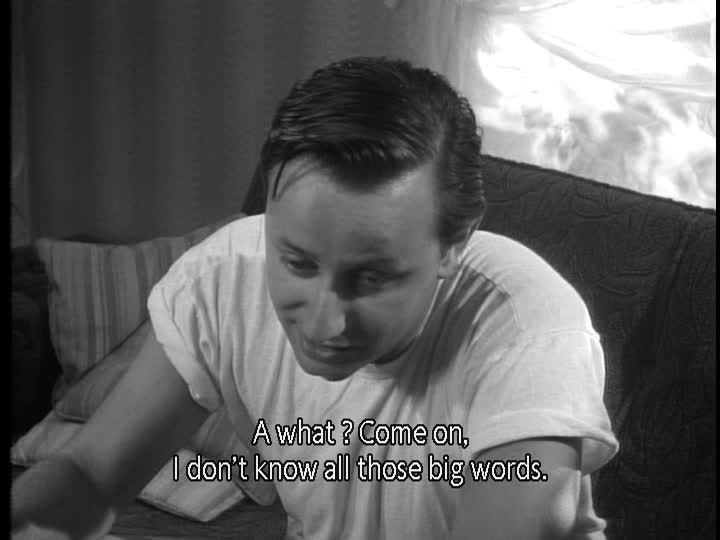

If you don't turn in the discussion questions and "Big Words," I count you as absent. In addition to writing the DQs, I ask that you write any "big" words you had to look up and their definitions. Depending on your vocabulary, you may need to look up a lot of words or only one or two. DQs without "big" words and their definitions will not count as passing work.
Discussion Questions: What Are They?
Each question includes 3-4 sentences describing conretely something you noticed and one or two sentences in the form of questions (that folow from your description). Two discussion questions, numbered one and two, are due for each class. When discussing a film, please refer to specific shots or aspects of a shot or sequences. When discussing a reading, please cite specific passages (and page numbers) or aspect of the text (and the relevant pages) you've read. The more concrete you are, the more other students will be able to move from your questions back to the text (a copy of which we will each have with us in class and which we will be discussing, of course).
Here is an example of what I consider to be excellent discussion questions a student wrote for a reading I assigned.
1. Freud explains the definition of the “uncanny” in different ways, but uses up a little over 5 pages (221 – 226) in the beginning to explain the nuance of the German word heimlich (its technical opposite unheimlich being roughly translated to “uncanny”). It starts off mainly meaning familiar and homely. As Freud goes on to extensively define the word, the definition of the word becomes more ambiguous until finally it comes to mean its exact opposite—except the word does not change. So Freud concludes that heimlich is a word “which develops in the direction of ambivalence, until it finally coincides with its opposite, unheimlich” (226). Even though unheimlich is an “opposite” of heimlich, Freud also calls it a “sub-species” (226). Instead of unheimlich being defined on its own, Freud defined it in relation to its “opposite.” There are mounting similarities between the two words. How does this development relate to what Freud understands to be uncanny? What greater implications of language/translation does this definition development have? How is this process uncanny itself? The word for uncanny is uncanny!
2. Freud emphasizes the theme of “double,” “which appears in every shape and in every degree of development” (234). To deal with the fear of death, humans create a double (like the concept of the immortal soul) as “an insurance against the destruction of the ego” (235). Correspondingly, this idea, Freud explains, also becomes a “harbinger of death” (235). This is also uncanny—because even while the soul or the “double” is trying to insure immortality, it is simultaneously tied to death in this way. In what other ways is the “double” uncanny? Is the idea that it is separated from the self yet closely tied to it? Because it sometimes acts independently of the self (“that man is capable of self-observation”) (235)?
NAME OF STUDENT (would go here).
Please put your name after the questions you email me (at [email protected]). Please put the name of the class in your email subecjt heading , and please put your name in your emailed topic / discussion discussions after your questions. (It just makes it easier for me to copy them on to this page.) Please make sure your questions are your own (taking them from imdb, Wikipedia, or any other outside source constitutes plagiarism, the consequence of which is failing the course), and please make them as concrete as possible (addressed to a specific aspect of the reading or film). Please limit your question to the film itself (don't bother with production or reception histories).Your questions should arise from a close reading of the film's form in conjunction with the readings.Your questions may or may not come up in class, but all students will should read all of them.
Why Do I Have to Write Discussion Questions?
Discussion can work extremely well, but it can only work and work well if all of you are equally prepared for discussion and only if you in fact do participate in class. You should be just as prepared to discuss on days you are not leading discussion as on days you are. The point of the questions is (a) that you do the readings and watch the films carefully (analytically); (b) that you come prepared to class to talk about the reading or film concretely; and (c) that you get practice for writing your papers and flim clip exercise (your papers will depend on your noticing the kinds of things in the readings and film that draw you to formulate questions about them. To this end, I will ask all of you email me I will then post these questions with your names on the course website or email them to you via the class email listerv before class. The day you lead class, you need not do the discussion questions.
Be sure to bring the assigned book or a print copy of all assigned electronic readings and bring it with you to class. If you don't bring the reading(s) with you, I count you as absent.